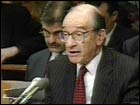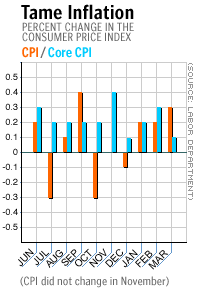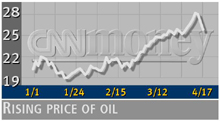
NEW YORK (CNN/Money) -
Saying the pace of the U.S. economic recovery remains uncertain, Federal Reserve Chairman Alan Greenspan Wednesday suggested he's in no hurry to raise interest rates.
In a speech to a congressional committee, Greenspan saw encouraging signs including low inflation, a buoyant housing market and the falling business inventories that may presage new orders.
But he also mentioned the possibility that rising consumer debt, steeper energy prices and other factors could hamper the rebound that has emerged this year.
"The degree of strengthening in final demand over coming quarters, an essential element in sustained economic expansion, is still uncertain," Greenspan told the Joint Economic Committee.
Since the Federal Reserve in March left interest rates steady following 11 cuts last year, economists have been trying to determine when central bankers will raise short-term borrowing costs -- something they haven't done since May 2000.
Rate hikes on hold
After Wednesday's remarks, Ian Shepherdson, chief U.S. economist at High Frequency Economics, is betting on no hike until at least August.
"Mr. Greenspan has all but ruled out a May tightening," Shepherdson said.
Tony Crescenzi, bond analyst at Miller Tabak & Co., agreed.
"Faced with this uncertainty, Greenspan would like to help nurture the nascent economic expansion by leaving rates steady on May 7," he said.

Among the uncertainties, the Fed chief mentioned rising oil prices, which "are again sapping the purchasing power of households." While Greenspan said that a limited rise in energy prices would have only a small effect, a large and sustained increase would have "far-reaching consequences.''
He also warned that falling household wealth could slow a rebound.
"Another factor likely to damp the growth of consumer spending in the period ahead, at least to some extent, is the change in overall household financial positions over the past two years," Greenspan said.
Still, the Fed chief pointed to the improvement in the labor markets, noting that the pace of layoffs has slowed and that jobs were created in March. And he once again was impressed with the "resilience" of the economy seven months after the terrorist attacks.
"Some of the forces that have weighed heavily on the economy over the past year or so have begun to dissipate, but other factors, such as the sharp increase in world oil prices, have arisen that pose new challenges," Greenspan said.
Little risk of housing bubble
A plunge in real estate prices helped cause the recession of the early 1990s. But the Fed chief said he sees little risk of a housing market bubble these days. He was also encouraged by the possibility of improved spending.
"Recovery in at least some forms of high-tech investment is under way," Greenspan told lawmakers.

But his most notable reference may have been to the time the Fed has before sending rates higher, saying "the Federal Reserve should have ample opportunity to adjust policy to keep inflation pressures contained once sustained, solid, economic expansion is in view."
At 1.75 percent, the federal funds rate for intra-bank overnight lending stands at a 40-year low.
Greenspan's remarks came hours after a big surge in demand for imports widened the February trade deficit beyond expectations. Economic data Tuesday showed that consumer prices remained tame in March while industrial production saw its biggest gain since March 2000. But housing starts were surprisingly weak.
Stocks, little changed before his comments, showed no major response to Greenspan's remarks. Treasury prices were lower.

|

